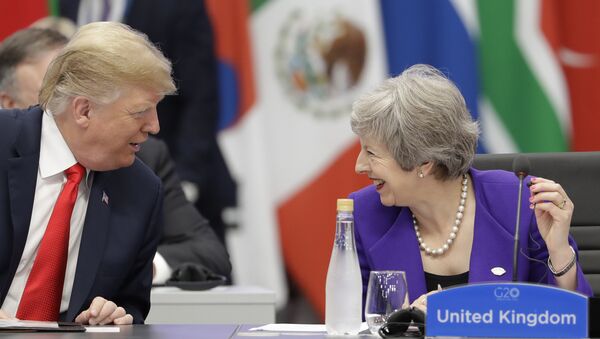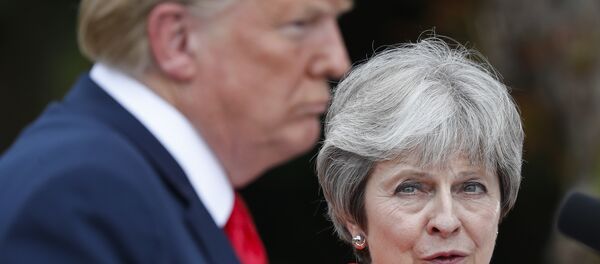On Tuesday, the Lords International Relations Committee noted that the actions of the Trump administration on issues such as the Iranian nuclear deal and the Paris climate change agreement were contrary to the interests of London.
In addition, the report recommended that the UK develop alliances elsewhere around the globe to maintain reformed multilateral institutions.
Radio Sputnik has discussed this issue in detail with Inderjeet Parmar, professor of International Politics and head of the Department of International Politics at City, University of London.
READ MORE: WikiLeaks Lambasts UK Media Over Attempt to Cover Up Assange's Extradition to US
Sputnik: What do you make of the timing of this report?
Professor Inderjeet Parmar: Well, I mean this report has been compiled over the last 11 or 12 months and to some extent it coincides with [and] perhaps reflects the vote to exit the European Union by the British people. In a way, it is an important report, but it is not a very ground-breaking one, because it pretty much repeats a fair bit of what we have already known, that Britain has to kind of reposition itself, to some extent, in regard to its core alliances. Here, the distribution of power in the world has changed very radically in the last 20 years or so, and Britain has been kind of grappling with that kind of shift itself.
And to some extent Britain is symptomatic of some of the things which are changing as well, because Britain is one of the core architects of the post-war rules-based order which they talk about in the report, but it is also one which is chasing a little bit against certain elements of it — in relation to Europe, for example. So I think yes, it reflects something important. It comes from the House of Lords, it is not a decisive political body, but it is an important advisory one, and it reflects something which I think most people who observe the world scene have been thinking about for quite some time.
Sputnik: And yet it would seem that US-UK relations are almost more crucial at this time as London prepares to leave the EU.
Professor Inderjeet Parmar: I think that's the big problem, that the United States, particularly under President Trump, but I think probably more broadly anyway. I think because the US is responding also to its loss of position, it also has to become more aggressive in what it can extract from every single relationship, whether it is a military relationship or it is a commercial or other kind of relationship. So, the squeezing of NATO allies for more spending there and on trade and tariffs and calling the European Union a foe, tariff war with China, and the offer for example to a post-Brexit Britain of a free trade agreement with the United States; I mean that's going to be a very hard bargain that President Trump is likely to want to drive. I think it is a very difficult position that Britain is in at the moment, but then I don't think it is alone in that in the world. Many other countries are, in fact, in a similar position as well.
READ MORE: 'US & UK Concerned About Probable Supply of Russian Weapons to Lebanon' — Expert
Sputnik: To what extent can the UK really afford to become less reliant on Washington at this point in time?
Professor Inderjeet Parmar: It's difficult for Britain to go too far out on a limb from the United States. I think every European power, or NATO power, and so on, has seen what is been going on in the United States the whole "America First" emphasis, and they have seen the unpredictability and unreliability of the words of President Trump, saying one thing doing the opposite, and then going back again. So everybody is kind of thinking "well, look, we need a European army, we need a greater level of self-reliance, we can't rely as well as we used to in the past", and I think Britain is a part of that too. But on the other hand, to some extent, Britain is more deeply integrated into the American alliances. As I have said, it is a core architect of the liberal order itself with the United States after 1945. It is a core member of NATO, one of the most important ones, which is able and willing to go to war to some level or other alongside the United States in various places around the world.
It is a big arms exporter. It is a part of the "Five Eyes". It is integrated into America's nuclear kind of programme, if you like; the Trident programme is a part of the American [nuclear programme], in a way. Post-Brexit, there is the big trade deal and I think that's going to be very difficult. So it is not very easy and I don't think they are saying "break away" from the US. I think they are just saying "look, there are other things going on and Britain is going to have to look after its own interests and make new alliances and liaison with other powers like China, in particular, but also India as well". You are going to have to explore those relationships in a variety of ways without giving up on some of your older ones, like Japan and so on as well. But I think in the end, its attachment to this what it believes is a kind of "the golden age of the liberal international order" from 1989 to the present or, 2015 or so. I think that is deeply problematic to be thinking that that was a golden age
Professor Inderjeet Parmar: I mean the United States and the core western allies — I don't think they are going to go anywhere. In particular, I think those are the core relationships, but I would suggest that I think the focus on Asia is bound to increase, and I think there is a desire to make sure that China is integrated, that you engage with China and that you take account of its military assertiveness in the region in East Asia, but at the same time you engage with the institutions that they have established, the Shanghai Cooperation Organisation [and] the Asian Infrastructure Investment Bank, for example; you stay engaged and close with those, so that effectively you are monitoring, you are cooperating, collaborating and also containing and leveraging Chinese power. I think that is the big thing. So that's why I think in this report India and Japan were really important, and in that regards that is part of the American strategy as well. So while this is signalling that the world is shifting and it has been for some time and is likely to continue to shift, America, for the UK, is too strategically central to be abandoned in any meaningful sense — it is too important.
Sputnik: On the other hand, if Trump's agenda of "America First" doesn't benefit the UK, why should London still comply with the US agenda?
Professor Inderjeet Parmar: I think this is a kind of renegotiation within the relationship rather than negotiating a way out of it. The fact is that in the end, Britain alone, according to its own foreign policy elites from the 1940s onwards, Britain alone was unable in its own due to be able to carry out of that global imperial role, which historically it did. It allied with the United States in order to try to piggyback on it, to some extent, but also because it was already a global financial and military great power. I think that is what they want to renegotiate, given the various changes that are going on. They are not abandoning it; they are renegotiating it.
The views and opinions expressed by the speaker do not necessarily reflect those of Sputnik.




